“Such as I am, I am a precious gift” – Zora Neale Hurston
With our research in Kaldi’s at the Depot on Emory University’s campus, our group aimed to answer the question of whether or not this college eatery is in fact an accurate representation of the Emory community. In our group project, we represented both our process in answering this question as well as the research and responses we garnered. Our project combined a physical piece, as well as a handwritten song and poem to carry our research. The physical piece of art ended up as four squares shaped like puzzle pieces that come together but do not “fit” like puzzle pieces should.
In this puzzle, we wanted each member to have her own piece in which she could describe her identity using art. By using pictures, drawings, painting, or song lyrics (more on this later), these various mediums enabled us to describe ourselves by use of physical means. For example, Allison wrote about her identity in her proposal. She explained how portions of her identity often conflict with one another, specifically using the example of being Jewish but not of the same socio-economic status as many of her peers. In her puzzle piece, Allison decided to expand upon these parts of her identity and add other parts as well. She also bring in her interests and passions to underscore her unique identity in contrast to others. Whether the parts of our identities we can see from the outside or those that come from within, we wanted our pieces of the puzzle to describe us. As we visually described these identities on our various puzzle pieces, they were placed, as can be seen in photos, to come together but not fit. We think this describes our experiences at Emory: we all come together with our different views and passions, but we don’t fit exactly right. And we believe this is exactly what our research from Kaldi’s represents: Emory tries to create a close community, but it is difficult for Kaldi’s to encompass all our identities in a clean manner. Some of us are left out and we don’t fit just right.
To complete this project, we utilized the artists’ cottage near the Schwartz Center for Performing Arts as a meeting ground. We had to be a bit creative in our materials as the cottage did not have everything we were looking for. All of our group members were involved in this production as each member creates their own “puzzle piece” – call it the ideal group project, if you will. This puzzle piece will be a representation of each of our own identities. We each made our own puzzle pieces that would later be connected to each other in the final project.
Some potential roadblocks we faced included time constraints and the inclusion of both fine and digital art in our final artwork. Time was possible roadblock because we are all busy college students and we certainly found difficulty in figuring out a good time when we could meet at the cottage as a full group. Another roadblock we faced was our ability to include both fine and digital art in our project. The project guidelines favored artwork that is defined as fine art. However, in order to truly artistically portray our observations of the people in The Depot by Kaldi’s Coffee, our group desired to use pictures or images from other mediums like the internet and magazines. The roadblock that we needed to overcome from this was simply finding the balance between the two, which we think we did rather successfully.
Our production of the physical portion of this project began as soon as Professor Morris received the key to the cottage. We tried to meet least once a week until the project was due but ideally met twice a week when possible. (In addition to the project, we needed to complete additional field notes for the final portfolio and for the benefit of our projects.) Simultaneously, Ayana was the primary group member responsible for the song portion of our project. Of course we all collaborated to produce this portion, but the song will really serve as the majority of Ayana’s “piece of the puzzle.” Allison wrote a poem to balance out the project with a portion that focused primarily on those we interviewed and study.
The song was used to demonstrate how the transition of the eatery happened over time as well as students’ views on these changes. Therefore, the song was designed to be an argumentative piece since the students often had opposing views. These views were pulled from the interviews that Ayana conducted over the time of the project and from articles read about the eatery on Emory’s Wheel website. When paired with puzzle pieces, the song showed how it is difficult for everyone’s identity to be represented and accounted for when the transitions of the eatery took place.
We are all very excited for this project to hit the internet, as we think it, in an artistic manner, demonstrates our understanding of how Kaldi’s serves (or does not serve) the needs of the Emory community. While we were not able to incorporate every single thing we learned in our field work in the artistic portion of the presentation, we aimed to fit as much as we could into this well thought out piece of artwork.
Photos of the Project, Emory University Schwartz Center (Reception Date: April 27, 2017)
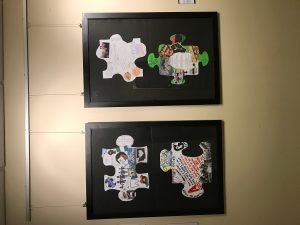
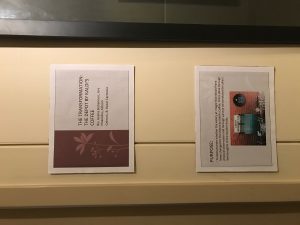
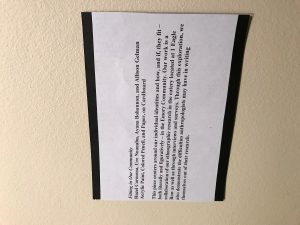
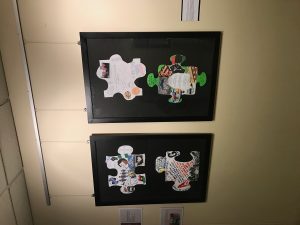
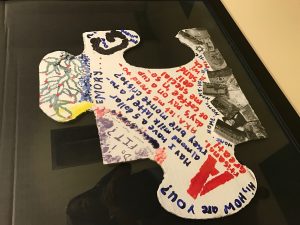
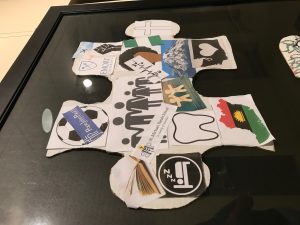
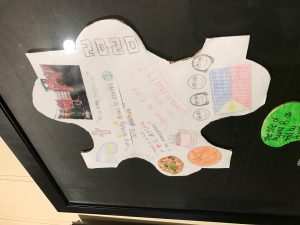
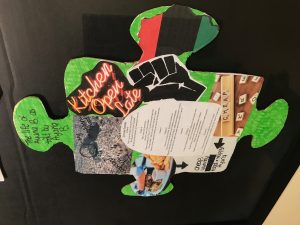
Song Adaptation
Culture Torcher
(chorus)
Now-a-days we have Culture Vultures[*]
But Kaldi’s is a Culture Torcher[†]
Maybe not for everyone, but for me, I’d say it is
(Verse 1)
They took away our wings
And they took away our fries.
When I walked into “Zaya’s,” I could not believe my eyes.
“It’s healthier,” they say, but I don’t recall us asking.
Organic foods, expensive coffee, my wallet they’re hijacking
(chorus)
(Verse 2)
Now it’s a place to study, instead of turning up
They used to have the music; all I needed was my buddies.
Whether Thursday, Friday, or Saturday, there were people ready to party,
But now they go to meet-and-greet and study cause it’s “artsy”
(chorus)
(Verse 3)
*talking* Speaking of artsy, don’t they have live shows now?
Yes, I’d say you’re right
Kaldi’s has a space for us to used their First A rights
Poems, songs, and conversation
Emory was just doing what they thought would bring elation
(Closing)
Kudos to you Emory, you thought you got it right
But maybe you might wanna call Sodexo and tell them to come back
[*] Social definition of Culture Vulture as given on Urban Dictionary: “someone who steals traits, language and/or fashion from another ethnic or social group in order to create their own identity.”
Personal Definition of Culture Torture for the purposes of the song: “someone who ruins, or dilutes culture”
Poem Adaptation
Fitting In
We do not all fit, but is that okay?
To the Greek life superstar, the lettered sweatshirt wearer, who pairs such apparel with her thousand-dollar bag, soul cycle is what I live for girl: this place was made for you.
To the kid who can’t afford tuition, never mind a latte, just trying to send home money to his parents who can’t seem to make ends ever meet: this place was not made for you.
To the boy scrambling his fingers across his Apple laptop, aiming to finish that length paper due Monday morning at 8:30am as he sips a four dollar espresso: this place may have been made for you.
To the girl who’s a wannabe, fake bag to wear with a latte, who can’t swing tuition but pretends she can, though it should not be: this place was made for you.
To the construction worker, Dobbs University Center Maintenance woman, dorm janitor who spends his morning cleaning the bathrooms: this place was not made for you.
Finance professor in Goizueta, whose coffee reminds him of the one he used to buy back on Wall Street: this place was made for you.
This place was not made for all of you. It is not my place to say that, to define a space as yours. I have absolutely no right to this action. But I do so for good reason. This microcosm of a larger community cannot be the standard we live by. It shows our flaws but not our holistic wrongdoing. A coffee shop does not represent our values as a whole, but it does represent an issue that faces us all.
My puzzle piece represents me. I am a piece who does not fit quite right with my peers by my side. Ayana does not fit, Hazel does not fit, neither does Ure. The Greek life superstar, the kid from the Bronx, the janitor making only a percentage of the tuition us students pay – we do not fit together. But is that okay?
Emory, you inserted a place to be a community hub that does not represent us all. I cannot – or should not – say he does not fit or she does not fit but I can say that some do and some do not. Is that okay? Is it okay for us all not be comfortable at a place in our community? Do we have a right to feel included as we pay tens of thousands and spend four years or more here? I’m just truly, really, simply not sure.
We do not all fit, but is that okay?
Thank you to Professor Nicole Morris for an amazing semester in English 210W. We have learned so much and have also had so much fun. This project would not have been possible without all your continued support.